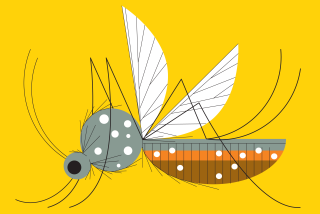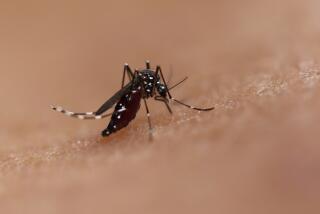How to Stop Bugs From Putting the Bite on You
- Share via
For most Americans, mosquitoes are less a health threat than a--slap! slap!--skin-deep annoyance.
Only female mosquitoes bite; males feed mainly on flower nectar.
Mosquitoes are attracted to prey by body heat, moisture and the smell of chemicals such as carbon dioxide on the skin and in exhaled breath. Using receptors on their antennae, mosquitoes can detect such chemicals from distances of 100 feet. It is those receptors that are blocked by the popular repellent DEET.
“Essentially it jams their receptors,” said Mark S. Fradin, a dermatologist in Chapel Hill, N.C., and author of an article about mosquito repellents last month in the Annals of Internal Medicine.
The perfect insect repellent, Fradin said, would repel all kinds of biting bugs, cause no irritation to the skin, have no odor and remain effective for at least eight hours without rubbing off. Unfortunately, he said, “no available insect repellent meets all of these criteria.”
The one that comes closest goes by the clunky chemical name of N,N-diethyl-3-methylbenzamide, or DEET. Developed by the U.S. Department of Agriculture and patented by the Army in 1946, it is effective against mosquitoes, biting flies, chiggers, fleas and ticks. DEET came into general use in 1957 and is now available in concentrations ranging from 5% to 100% in a variety of forms, including lotions and creams.
For most use, Fradin said, a DEET concentration of 10% to 35% is adequate. The American Academy of Pediatrics recommends a maximum concentration of 10% for young children. DEET can be toxic, but most reports of its toxic effects involve long-term excessive or inappropriate use, and the Annals of Internal Medicine review concluded that the chemical has “a remarkable safety profile.” In a 1994 review of more than 9,000 cases of reported possible DEET overexposure, the most common symptom was temporary irritation of the eyes.
Other touted repellents remain largely untested or unproven, the medical journal concluded. For example, Skin-So-Soft bath oil was found under laboratory conditions to provide one-tenth as much protection as low-concentration DEET. Plants said to be naturally repellent to mosquitoes include citronella, cedar and pennyroyal. Most have been poorly studied or found to provide short-lived protection, if any. Citronella, a registered insect repellent, is less effective than DEET, Fradin said.
Nor do backyard electric bug-zappers help. A study of backyard bug-zappers in Newark, Del., found “no evidence that zappers control nuisance insects.”






